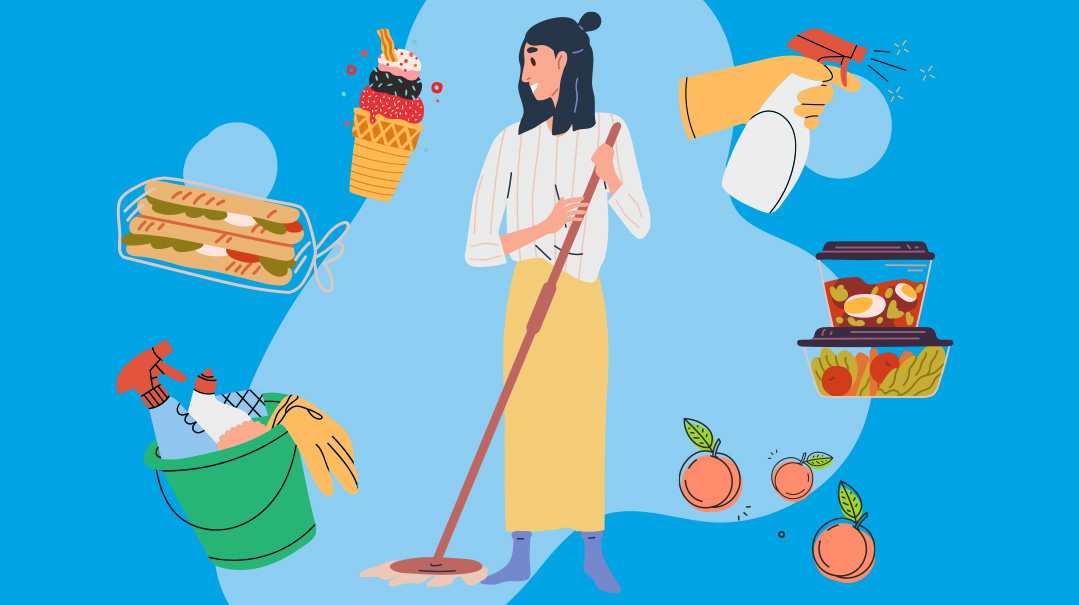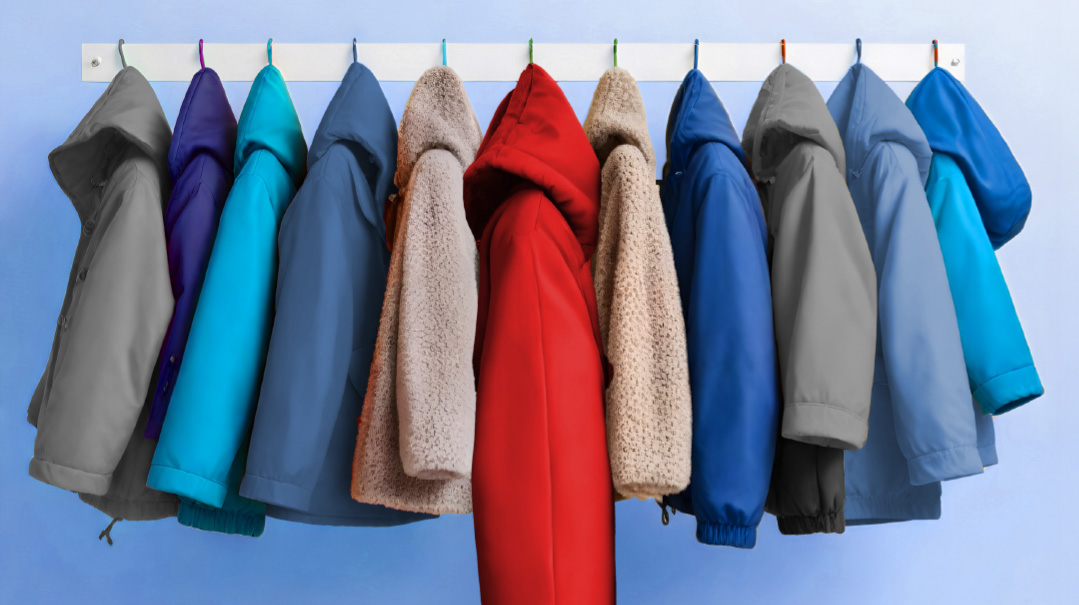All Roads Lead to Pesach
| March 14, 2023Women like you divulge how they do Pesach

When I asked different women to share how they make Pesach, I was looking forward to learning new things, but I was caught off guard when one woman said that her mother starts preparing on the 4th of July. “I’d love to hear about the process,” I said. “I assume a lot of the early stuff is decluttering.”
“No way,” came the reply. “There is no clutter.”
Oh. You can’t say that about my own home (filled with totally reasonable clutter for a house with five youngish children). I needed to take some deep breaths to regain my equilibrium, and calmed myself down by telling myself that no one would ever think I have Hungarian roots anyway. Fortified with that self awareness, I prepared to learn more about how other superheroes (aka frum Jewish women) make Pesach.
Back to Basics
M
aking Pesach is definitely a huge job, and like all tasks, a great first step is knowing what needs to be done. While we’d all love to get that spring cleaning in, clarifying the halachic obligations of Pesach cleaning can go a long way to bring stress levels down. Ora Drexler, a teacher and graphic designer originally from the Five Towns but now living out of town, who’s been making Pesach for nearly a decade, feels strongly about this.
“My husband and I are both baalei teshuvah, so we don’t go to our parents for Pesach. I’ve never not made Pesach,” she says with a chuckle.
“I think that a lot of people stress about things that are so beyond halachah. It’s very important to know the halachah, and to know where you stand and where you’re holding based on your family and your rav, and what works for you in this time of your life. For instance, if you’re going through something challenging, it might be okay to hold a little differently during that time. It’s worth it to ask.
“It’s important to know where the line of mutar and assur is. It doesn’t mean you stand on the line, but you should know where it is.
“I’m grateful we have rebbeim here who help us navigate what’s halachah and what’s chumra. I really feel that learning the halachah is the key to a holy, healthy, and happy Pesach.”
Shana,* who lives in a large out-of-town community, and has been making Pesach for 15 years, also learned more about the halachos of Pesach when she got older, and found herself floundering at first. “While we didn’t eat vadai chometz on Pesach, in the house I grew up in, the cleaning was over in an hour,” she says. “When I went to seminary, I learned about a whole world of halachos I hadn’t been exposed to until that time.
“After I got married, I wanted to make the holiday even more kosher, but I fumbled through the preparations with a lot of panic, many questions, and more than a few tinfoil lacerations on my hands.” She’s very grateful to her rebbetzin, who showed her that making a kosher Pesach didn’t have to be synonymous with stress and overwhelm.
“My rebbetzin realized that I could benefit from not just halachic guidance but a companion to show me that it could be done calmly, efficiently, and even with some joy. I think of her whenever I turn over my kitchen on my own now and try to keep my eyes on the prize: a kosher and calm start to the holiday.”
I keep kosher l’Pesach snacks handy for the two days before the chag (and for Chol Hamoed trips). That ensures that there’s less stress about crumbs. The processed items that my family enjoys that sell out (looking at you, Matzolah), I order early and stick in a bin until my pantry is ready for Pesach.
—Shana
Making It Work
T
here’s an expert for every subject under the sun today, and making Pesach is no exception. Lakewood-based Chantzy Weinstein, a recipe developer and ardent enthusiast of the kitchen and lists, has been giving women tips on how to make Pesach since 2015 on her Instagram account, Kosher.com, and Between Carpools. She comes by it honestly; she says her mother was super organized. In fact, she has a childhood memory of her mother opening the Pesach kitchen in the summer and making peach compote when peaches were in season. “It wasn’t weird for us at all that she opened her Pesach kitchen in the Nine Days and then closed it back up. It was totally normal.”
When Chantzy herself first got married, she wasn’t very organized about Pesach, but these days she’s a pro, and is glad to spread the wealth, sharing tips with women eager to learn.
She approaches Pesach as a project to be methodically tackled, taking a blank calendar, photocopying the months of March and April, and then making a list of all the things that need to get done, from desserts down to the salt water. She allocates one or two jobs per day, making sure they coordinate, so, for example, she wouldn’t assign two dishes that need the oven for the same day. She also references the calendar to compile her weekly shopping list, making sure the pantry is stocked with the ingredients she’ll need for the week’s tasks. “Once I have my list and my calendar, it’s not overwhelming,” she says. “When I finish my list for the day, I’m good.”
She’s lucky to have a Pesach kitchen and starts her prep around Purim time. “I start slowly,” she says. “I don’t like to cram it in. I’m happy to do three things a week at first, and then afterward, I start doing much more.”
She says she tries to do a lot of the decluttering in the winter. “In the winter it’s cold and quiet. That’s when I have time to go through the closets and give away the clothing. Also, I don’t want to be spring cleaning when the weather is nice — that’s when I want to be outside enjoying the beautiful weather!”
The spring cleaning isn’t the only thing she does in the winter. “I make my ten pieces of bread in February, because why not? On Motzaei Shabbos, I put the extra challah in bags and put the pieces in my freezer. I always make a package for my mother also, that’s my gift to her, making her ten pieces of bread and mailing it to her. She waits for it every year.
“If I ever have a friend who’s making a simchah or having a baby, I’ll make them a package of ten little pieces of bread, too. They all think I’m crazy, but they also all thank me Erev Pesach.”
This may all sound wonderful for those of us who have Pesach kitchens, but there’s still hope for the rest of us! Julie Hauser is the author of Pesach While You Sleep: The Easy Way to Cook Ahead for Yom Tov… No Pesach Kitchen Necessary!
Through both her book and the workshops she runs, she teaches women that they can feed their families and be well rested. In a nutshell, it boils down to setting up a rudimentary Pesach kitchen in the corner of the laundry room or whatever space makes the most sense in each house, made up of a folding table covered with foil, some basic kitchen tools (a cutting board, knives, peelers, and a few gadgets) and most importantly, multiple crockpots or Instant Pot.
Thanks to the magic of the crockpot, Julie can fill her freezer over a five-to-six-day period without having to spend nearly any time in her quasi-Pesach kitchen. She spends about ten to 20 minutes in her makeshift kitchen area every day, prepping the days’ recipes to cook (think soups, meats, chicken, vegetable side dishes, even matzah balls and applesauce) and packaging whatever has cooked overnight for the freezer. In 2020, she updated her book to include Instant Pot recipes, which can significantly speed up the prep time.
When she reaches the homestretch in those hectic final days before Yom Tov and the kids are out of school, she doesn’t have to worry about basic menu prep. It also minimizes the amount of cooking she needs to do Chol Hamoed.
If you want to prepare early but you don’t want to turn over, you can clean the stove and the fridge and get the layers off. Then when it comes time to clean for Pesach, it’s just a general wipe down.
—Zahava
I have a list in my basement of what I need for this year, how much of everything I used last year, what I should make and what I shouldn’t. I can cook on Yom Tov, so I do all my baking first.
—Brocha
We involve our kids, and they actually get really excited. The schools do a good job of getting it in their head that they have to help clean. We make a competition out of it by going out for ice cream right after the kitchen cleaning is done. They have a certain number of points they can earn by cleaning various things, and the highest number of points gets you three scoops of ice cream, less than that gets you two scoops, and less than that gets one scoop. That’s actually motivated them for many, many years.
—Raizy
Take Two
G
oogle docs and execution lists will always have a special place in any type-A heart, but that’s not the only way to make Pesach.
While many people start Project Pesach Cleaning with the least-used rooms, Zahava Goldstein, a baalas teshuvah who had to start from scratch figuring out how to make Pesach, takes a different approach. Over the past 30 years, she’s made Pesach in seven different cities, in three different countries. “We usually start with the kitchen, because that’s the most important, and save the bedrooms for last. We don’t let food in them, so they don’t have to be done as well.
“We make ourselves a chometz kitchen somewhere else, like in the dining room or wherever we can, and that will be one of the last places we clean. From the time we start cleaning, we don’t give the kids chometz anymore, we give them kitniyos snacks.”
Their makeshift kitchen includes a milchig toaster, fleishig microwave, panini maker, urn/coffee maker, and garbage can. They take a folding table and set everything up on top and underneath and try to use as many disposables as possible.
“One year we put the microwave on the table and the two-year-old took my cell phone and decided to cook it,” recalls Zahava with a laugh. “It made a little fire, and we had to get a new microwave after that. You have to be careful to watch the toddlers!”
Sylvia Fallas, a Brooklyn-based food blogger, cooking instructor, and private chef, also gets started on the prep before her house is cleaned for Pesach. She’s been making Pesach for 16 years. Sylvia is Syrian, which means, among other things, rice. Lots and lots of rice. She starts checking her rice right after Purim and does a few glasses every night (rice is measured in glasses, not cups). “We always check tons of rice ‘just in case.’ I checked ten pounds one year for my family, which was, at the time, just a family of four! I was worried about running out! Rice is such a staple.”
The kitchen doesn’t need to be kashered to do the checking, and Sylvia just uses a white Pesach tablecloth. She covers her table and pours out a pile of rice, using her fingertips to slide each grain across the table and visually inspect it. Any debris or discolored grains get removed. This whole process is repeated three times. “I used to do it with my mom. My daughters (aged twelve and eight) help me, even though sometimes that means it’s more of a mess. Some years I checked alongside a friend — it makes it less tedious.”
She uses the checked rice to prepare mechshe (stuffed vegetables) and hashu (meatballs) for the chag. “Once the butchers go kosher l’Pesach, I buy my meat and prep on covered counters. Then it all goes into the freezer raw.”
I need my kids to be well-fed Erev Pesach. I have a lot of boys, and they’re big, so a leben and a string cheese aren’t going to cut it for them. A few weeks before Pesach, when my kitchen is chometzdig, I buy fresh bagels and take orders of what everyone wants. I say if the airlines can freeze eggs, so can I. I sit for an hour or two making sandwiches, then I wrap them in foil with names and freeze them. Even the cleaning lady gets one! On Erev Pesach, I put them in a pan in my chometz oven to warm them up. When everyone comes home from shul, they eat them outside on the porch.
—Chantzy
Believe It or Not
Systems aside, there will always be events that throw a wrench into the best-laid plans, and expecting a baby Pesach time can lead to additional stress, unpredictable challenges, and innovative solutions.
Hudy Abrams, originally from Lakewood but now living in Dallas, was expecting twins when the doctor put her on bed rest, just a few weeks before Pesach. She wasn’t allowed out of bed except to take a shower, but didn’t see why that would stop her and her husband from running the community Seder they had planned. “We were very heavily involved in kiruv back then,” she remembers, “and life had to go on even though I was in bed. So I spent my time in bed creating a whole system and a whole plan for everything that needed to get done — everything from cleaning to the food prep to shopping.”
By her own admission, she was super focused on making sure they were on schedule, reflecting amusedly that she and her husband were very young and idealistic, and wanted to just continue making a difference without being slowed down too much by the physical limitations. “I remember my mother-in-law saying, ‘You should write a book on how to do Pesach from bed.’ ”
A rav told me that if it’s poison it’s not food, so I take my Windex and it goes everywhere. If I see something in a drawer and I can’t tell if it’s a crumb or not, instead of going through the anxiety of wondering, I just Windex everything.
—Ora
Role Reversal
While Pesach cooking has traditionally been the woman’s job, some families do it differently. Ranya Greenberger from Cleveland found herself benefitting from her husband’s profession. During the years her husband, Dovie, was a caterer, he would make the Pesach food at work and bring it home. “Right before Pesach, all my Pesach food would show up. That was amazing,” Ranya says. She had many small children during those years, and she found it such a relief to not have to cook for Pesach in addition to the cleaning and childcare she was shouldering.
While Dovie left catering five years ago, he still does the cooking, although Ranya admits that she has mixed feelings about it.
“I know it sounds like it should be great — all the food made for me,” Ranya acknowledges. “But I had a little bit of a complex about it, about being the only woman who didn’t seem to be cooking for Pesach. Over the past couple years I’ve come to be at peace with it. I do make pancakes every morning of Chol Hamoed — that’s my Pesach food job.”
Whatever the journey, the goal is the same: ushering in Yom Tov to a calm, kosher home. Shana says she’s come to see Pesach as more than a source of tension. “I learned to see Pesach as the one day a year my place is super clean. Flowers are starting to bloom, the sun is out. The mess is cleared. When we see it as something to look forward to instead of just a stressor, we’re understanding the assignment.”
So many of the ingredients I use for Pesach are available year-round with the exception of the frozen garlic cubes. So if those aren’t in the store when I start cooking, I make my own by “roasting” a bunch of whole heads of garlic (unpeeled, tops cut off) in my Instant Pot for five minutes (or in the crockpot for several hours), drizzled with a little olive oil and a pinch of salt. When it cools, I put on a vinyl glove, squeeze out the garlic into a few ziplock bags labeled “P,” and freeze. Whenever I need a “garlic cube” (okay, they are really blobs), they’re ready to be plopped into a recipe!
—Julie
(Originally featured in Family First, Issue 835)
Oops! We could not locate your form.







